Anecdotal evidence from farmers, vets and shearing contractors point to a growing problem in the spread of sheep scab and lice.
Many say that the problem has been slowly re-emerging and is now a very significant issue in some parts of the country.
The spread is being blamed on a move away from plunge sheep dipping, as well as inadequate control measures in place on many farms.
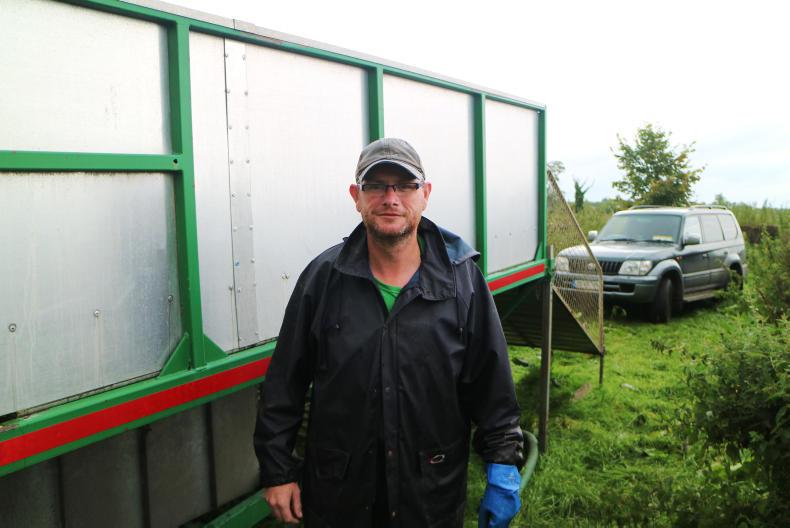 Kevin Sheridan from Co Meath started a contract mobile plunge sheep dipping service in 2012 to cater for growing demand from neighbouring farmers.
Kevin Sheridan from Co Meath started a contract mobile plunge sheep dipping service in 2012 to cater for growing demand from neighbouring farmers.
“I had a simple machine before 2012 for my own use. I also dipped for a few neighbours and found demand growing by word of mouth. I looked into getting a bigger dipping unit but there weren’t any available on the Irish market.
"After a bit of research, I decided there could be a viable business in providing a dipping service, so went ahead and got the trailer unit made.”
The trailer dipping unit is about 20ft long with the main components being the sheep dipping tub at the rear and a draining pen to the front.
There is also a storage area where two barrels for storing water can sit comfortably to the rear, while to the left of the dipping tub there is a platform to hold two sheep, which will encourage others up the loading ramp.
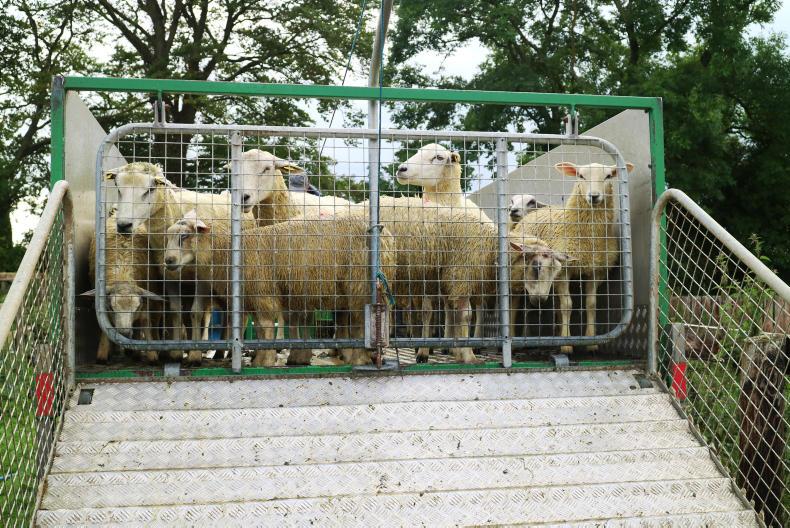
The trailer unit also has a lower level storage area to hold a water tank and also provides an option of transporting sheep hurdles, if required for penning.
The dipping tub itself is constructed with a curved mouth at the top, which aids in getting sheep into the tub and also prevents sheep from climbing out. Kevin is very focused on ensuring sheep get the optimum treatment to control sheep scab and lice.
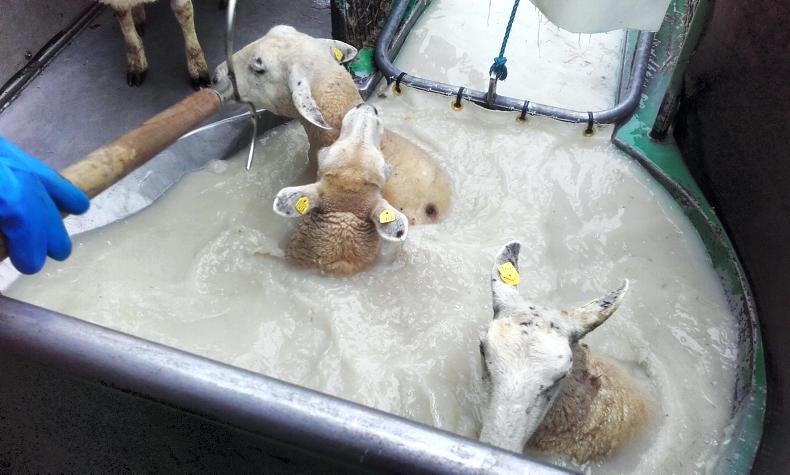
The advice of fasting ewes before dipping reaps rewards with less pressure on sheep in the dipping tub and less pressure on the dipping operator.
“From my point of view, there is no point dipping if it is not going to do the trick. My business has developed on word of mouth and people being happy with the results. If I was to do anything to risk that I’d be shooting myself in the foot,” he says.
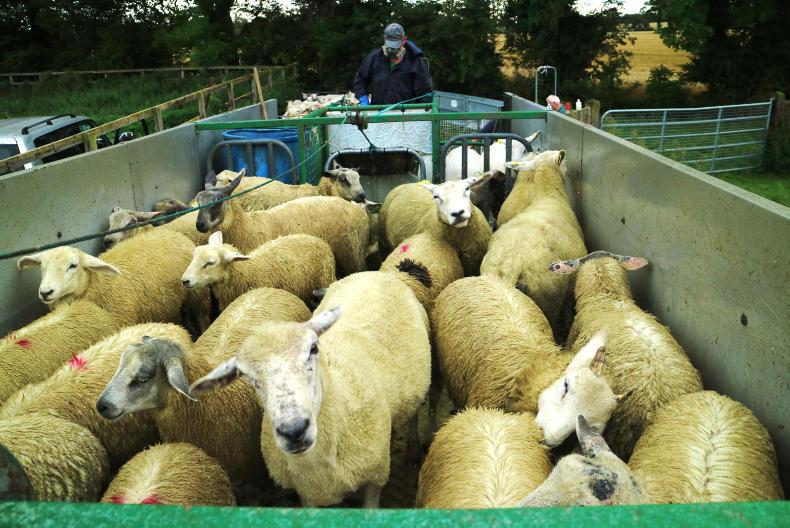
Sixty second dip
Once in the dipping tub, sheep are retained in the solution for at least 60 seconds and fully immersed at least once.
Kevin has a clicker to keep count of sheep hanging beside the tub. This allows numbers passing through the tub to be accurately counted, which Kevin says is a crucial element in topping up the solution.
“I start out with 700ml of dip and top up the dip after every 40 sheep with 200ml of dip, regardless of if it is ewes or lambs that are passing through. The correct concentration is as important as keeping sheep in the tub for 60 seconds.
"You can’t achieve the desired results if one of these is lacking.”
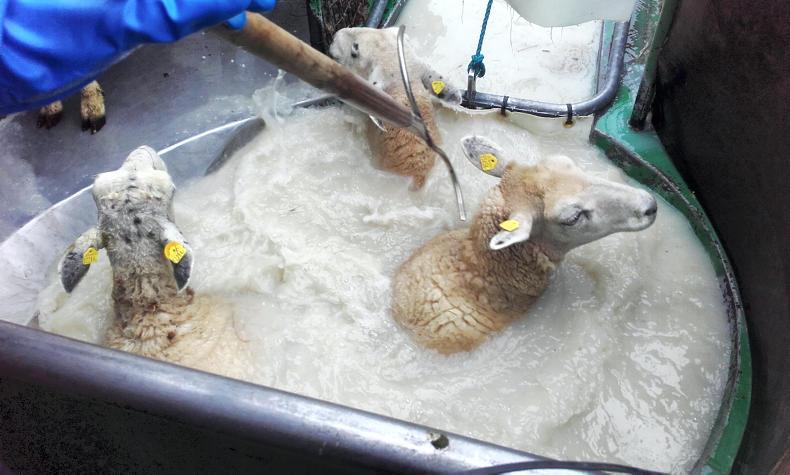
The sheep can be safely manouvered from a standing platform at the rear of the unit.
The dipping tub holds about three mature ewes or four lambs comfortably. This in turn means about 90 normal sized ewes can be dipped per hour.
The fact that sheep are given at least a minute in the dipping tub allows plenty of time for excess dip to drain from sheep in the draining pen.
The gate of the draining pen is operated on a pulley system from the back of the dipping tub, allowing sheep to be let loose without having to move. It closes under the weight of the gate.
Bimeda link-up
Kevin is one of four farmers offering the plunge dipping service who have linked up with Bimeda Ireland.
This means there are two dipping options: Ectoflits, which is an organophosphate-based (OP)product; and Cyperguard, which is a non-OP based dip.
Kevin says that many sheep farmers still prefer to use an OP-based product but there has been some more interest in non-OP dips, given the lower health concerns. The health of the operator is another area Kevin is passionate about.
Safety first
“You only have one pair of lungs so it’s important that the right precautions are taken. It can be tough to wear the waterproof gear and ventilation mask in warm weather but it’s by far the lesser of two evils, you couldn’t have it any other way.”
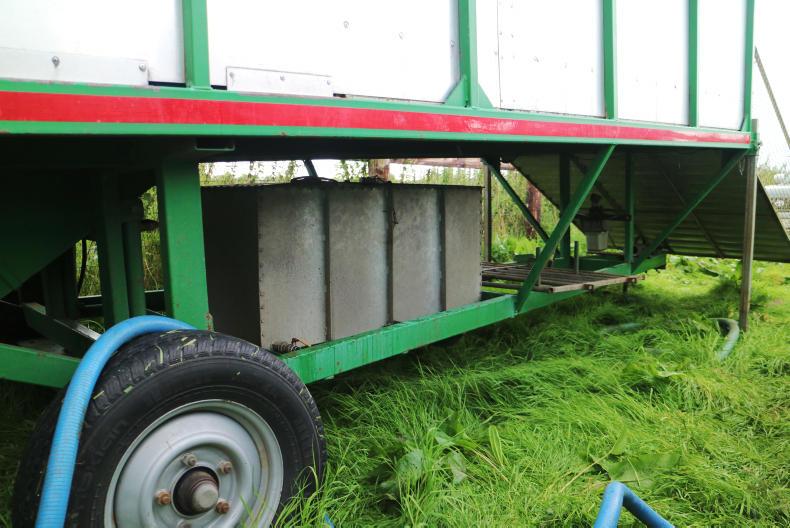
There are also precautions to make life easier for animals. Kevin says that, where possible, sheep should be fasted (but not prevented from drinking) for a period before dipping as this greatly reduces the pressure on animals in the dip tub.
Holding animals in an area with clean underfoot conditions is also a must as it will greatly help hygiene.
Cost of the service
The typical cost of the service is around €1.40 to €1.50 per head, with lower prices negotiable for jobs involving larger numbers and a shorter setup time. This charge includes the cost of the dip.
Kevin says: “Demand varies from a range of customers. There are some farmers who never miss an annual dip, while there are others who combine dipping with alternative injectable or pour-on products and dip every two years.
“And then there are some customers who dip when they see problems occurring. This section is growing and I have seen plenty of flocks where problems have occurred when infected sheep have been brought into a flock and not received precautionary treatment.”
Read more
Teagasc recruiting new sheep BETTER farm participants
Special focus: don't take shortcuts with animal health
Anecdotal evidence from farmers, vets and shearing contractors point to a growing problem in the spread of sheep scab and lice.
Many say that the problem has been slowly re-emerging and is now a very significant issue in some parts of the country.
The spread is being blamed on a move away from plunge sheep dipping, as well as inadequate control measures in place on many farms.
 Kevin Sheridan from Co Meath started a contract mobile plunge sheep dipping service in 2012 to cater for growing demand from neighbouring farmers.
Kevin Sheridan from Co Meath started a contract mobile plunge sheep dipping service in 2012 to cater for growing demand from neighbouring farmers.
“I had a simple machine before 2012 for my own use. I also dipped for a few neighbours and found demand growing by word of mouth. I looked into getting a bigger dipping unit but there weren’t any available on the Irish market.
"After a bit of research, I decided there could be a viable business in providing a dipping service, so went ahead and got the trailer unit made.”
The trailer dipping unit is about 20ft long with the main components being the sheep dipping tub at the rear and a draining pen to the front.
There is also a storage area where two barrels for storing water can sit comfortably to the rear, while to the left of the dipping tub there is a platform to hold two sheep, which will encourage others up the loading ramp.

The trailer unit also has a lower level storage area to hold a water tank and also provides an option of transporting sheep hurdles, if required for penning.
The dipping tub itself is constructed with a curved mouth at the top, which aids in getting sheep into the tub and also prevents sheep from climbing out. Kevin is very focused on ensuring sheep get the optimum treatment to control sheep scab and lice.

The advice of fasting ewes before dipping reaps rewards with less pressure on sheep in the dipping tub and less pressure on the dipping operator.
“From my point of view, there is no point dipping if it is not going to do the trick. My business has developed on word of mouth and people being happy with the results. If I was to do anything to risk that I’d be shooting myself in the foot,” he says.

Sixty second dip
Once in the dipping tub, sheep are retained in the solution for at least 60 seconds and fully immersed at least once.
Kevin has a clicker to keep count of sheep hanging beside the tub. This allows numbers passing through the tub to be accurately counted, which Kevin says is a crucial element in topping up the solution.
“I start out with 700ml of dip and top up the dip after every 40 sheep with 200ml of dip, regardless of if it is ewes or lambs that are passing through. The correct concentration is as important as keeping sheep in the tub for 60 seconds.
"You can’t achieve the desired results if one of these is lacking.”

The sheep can be safely manouvered from a standing platform at the rear of the unit.
The dipping tub holds about three mature ewes or four lambs comfortably. This in turn means about 90 normal sized ewes can be dipped per hour.
The fact that sheep are given at least a minute in the dipping tub allows plenty of time for excess dip to drain from sheep in the draining pen.
The gate of the draining pen is operated on a pulley system from the back of the dipping tub, allowing sheep to be let loose without having to move. It closes under the weight of the gate.
Bimeda link-up
Kevin is one of four farmers offering the plunge dipping service who have linked up with Bimeda Ireland.
This means there are two dipping options: Ectoflits, which is an organophosphate-based (OP)product; and Cyperguard, which is a non-OP based dip.
Kevin says that many sheep farmers still prefer to use an OP-based product but there has been some more interest in non-OP dips, given the lower health concerns. The health of the operator is another area Kevin is passionate about.
Safety first
“You only have one pair of lungs so it’s important that the right precautions are taken. It can be tough to wear the waterproof gear and ventilation mask in warm weather but it’s by far the lesser of two evils, you couldn’t have it any other way.”

There are also precautions to make life easier for animals. Kevin says that, where possible, sheep should be fasted (but not prevented from drinking) for a period before dipping as this greatly reduces the pressure on animals in the dip tub.
Holding animals in an area with clean underfoot conditions is also a must as it will greatly help hygiene.
Cost of the service
The typical cost of the service is around €1.40 to €1.50 per head, with lower prices negotiable for jobs involving larger numbers and a shorter setup time. This charge includes the cost of the dip.
Kevin says: “Demand varies from a range of customers. There are some farmers who never miss an annual dip, while there are others who combine dipping with alternative injectable or pour-on products and dip every two years.
“And then there are some customers who dip when they see problems occurring. This section is growing and I have seen plenty of flocks where problems have occurred when infected sheep have been brought into a flock and not received precautionary treatment.”
Read more
Teagasc recruiting new sheep BETTER farm participants
Special focus: don't take shortcuts with animal health
 Kevin Sheridan from Co Meath started a contract mobile plunge sheep dipping service in 2012 to cater for growing demand from neighbouring farmers.
Kevin Sheridan from Co Meath started a contract mobile plunge sheep dipping service in 2012 to cater for growing demand from neighbouring farmers. 
















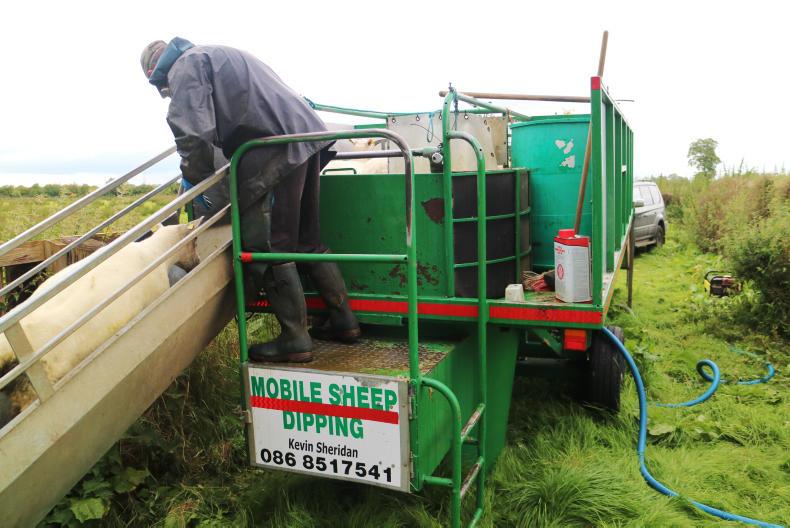
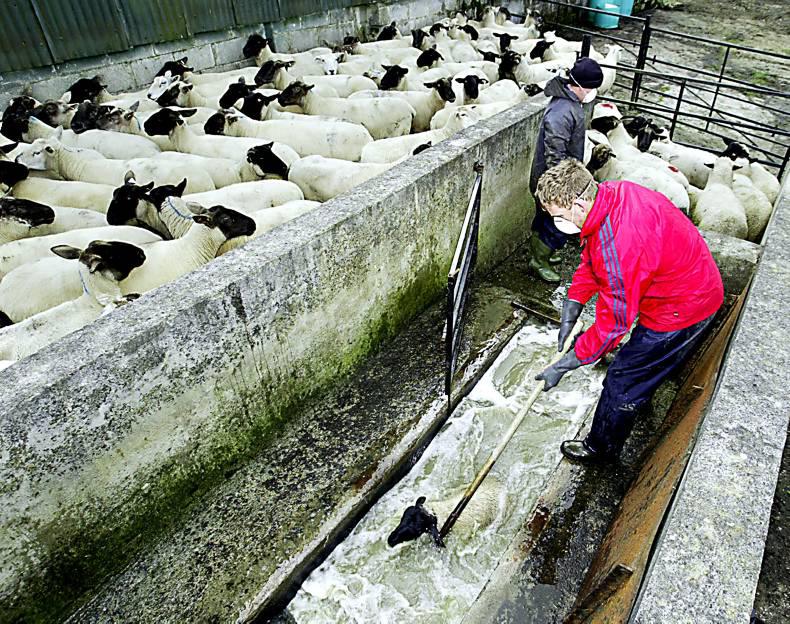

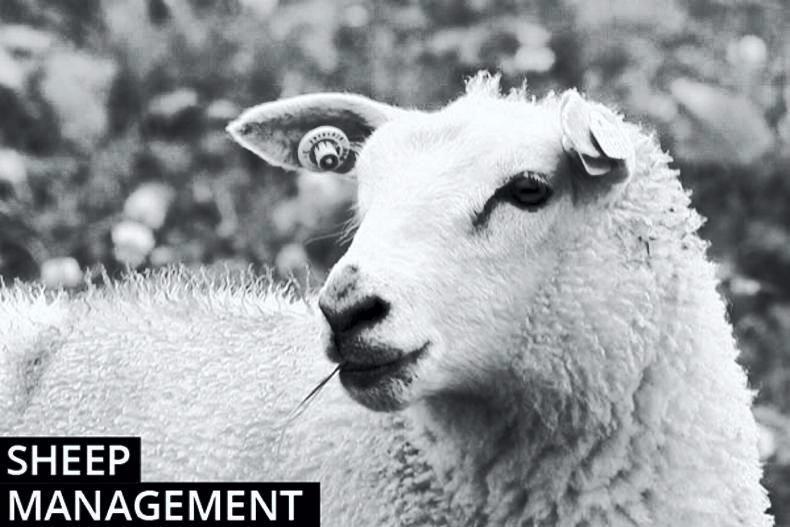
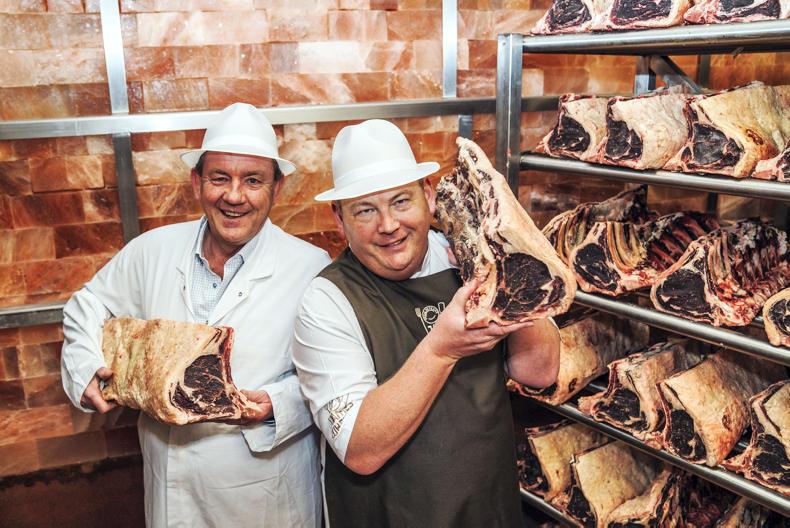
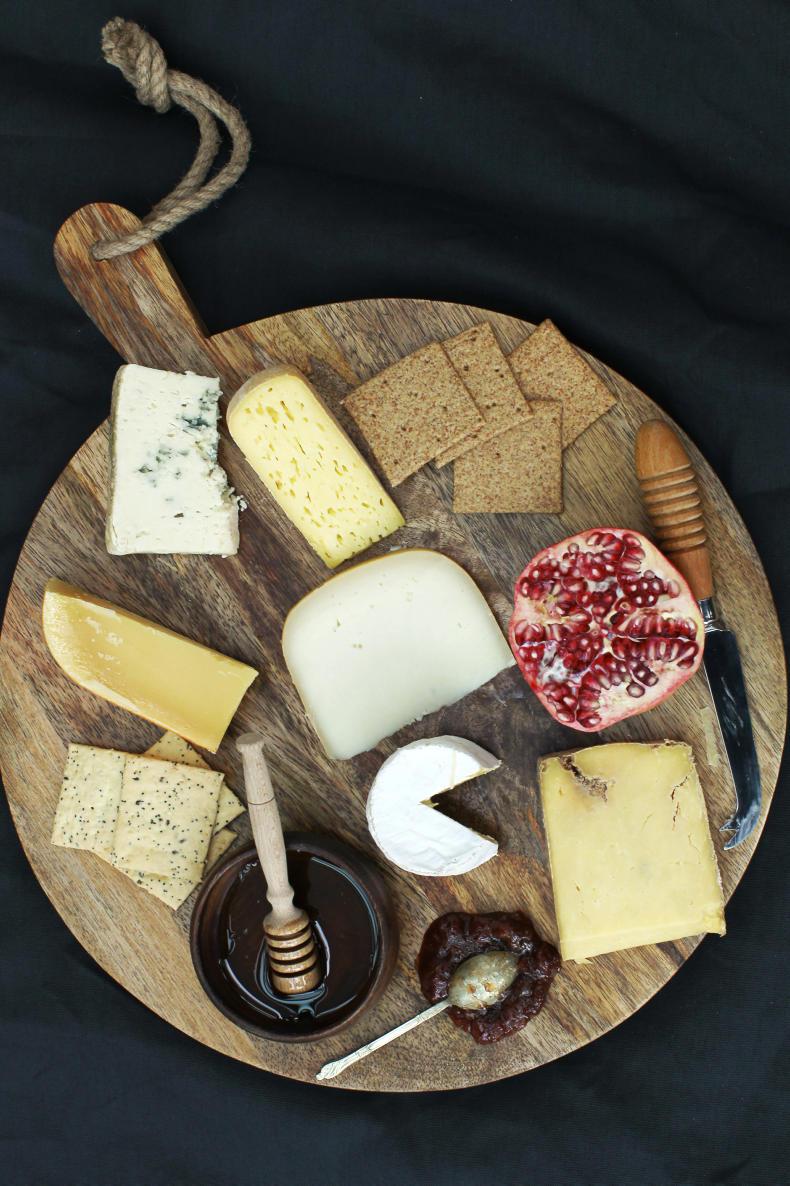
SHARING OPTIONS